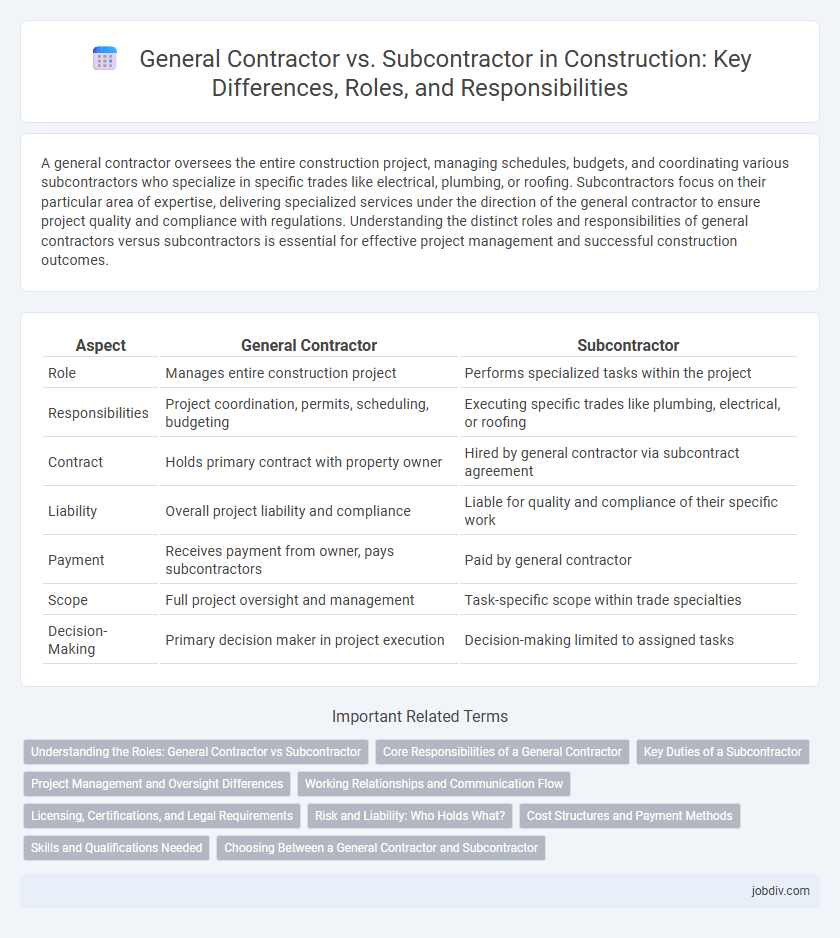A general contractor oversees the entire construction project, managing schedules, budgets, and coordinating various subcontractors who specialize in specific trades like electrical, plumbing, or roofing. Subcontractors focus on their particular area of expertise, delivering specialized services under the direction of the general contractor to ensure project quality and compliance with regulations. Understanding the distinct roles and responsibilities of general contractors versus subcontractors is essential for effective project management and successful construction outcomes.
Table of Comparison
| Aspect | General Contractor | Subcontractor |
|---|---|---|
| Role | Manages entire construction project | Performs specialized tasks within the project |
| Responsibilities | Project coordination, permits, scheduling, budgeting | Executing specific trades like plumbing, electrical, or roofing |
| Contract | Holds primary contract with property owner | Hired by general contractor via subcontract agreement |
| Liability | Overall project liability and compliance | Liable for quality and compliance of their specific work |
| Payment | Receives payment from owner, pays subcontractors | Paid by general contractor |
| Scope | Full project oversight and management | Task-specific scope within trade specialties |
| Decision-Making | Primary decision maker in project execution | Decision-making limited to assigned tasks |
Understanding the Roles: General Contractor vs Subcontractor
General contractors oversee the entire construction project, managing schedules, budgets, and subcontractors to ensure timely and within-budget completion. Subcontractors specialize in specific trades such as plumbing, electrical, or drywall, executing detailed tasks under the general contractor's supervision. Clear role delineation between general contractors and subcontractors is essential for efficient workflow and project accountability.
Core Responsibilities of a General Contractor
A general contractor oversees the entire construction project, managing scheduling, budgeting, and compliance with building codes and safety regulations. They coordinate subcontractors, procure materials, and ensure work meets quality standards and project specifications. Their core responsibility is to serve as the primary point of contact for clients and stakeholders, delivering the project on time and within budget.
Key Duties of a Subcontractor
Subcontractors specialize in specific construction tasks such as electrical work, plumbing, or drywall installation, executing these duties under the direction of the general contractor. They provide skilled labor and specialized expertise, ensuring quality and compliance with project specifications and safety standards. Subcontractors manage their own workforce and equipment, maintain schedules for their portion of the work, and coordinate closely with the general contractor to meet overall project deadlines.
Project Management and Oversight Differences
General contractors manage the overall construction project, coordinating schedules, budgets, and subcontractors to ensure timely completion and quality control. Subcontractors specialize in specific trades, such as electrical or plumbing, focusing on executing their scope of work under the general contractor's oversight. Project management by general contractors involves comprehensive oversight, risk management, and communication with clients, whereas subcontractors primarily concentrate on task-specific execution within established guidelines.
Working Relationships and Communication Flow
General contractors oversee entire construction projects, coordinating all aspects and managing subcontractors to ensure timely completion within budget. Subcontractors specialize in specific trades, performing targeted tasks under the general contractor's supervision while maintaining communication primarily through project managers or site supervisors. Effective working relationships rely on clear communication flow, with regular updates, progress reports, and coordinated scheduling critical to prevent delays and maintain quality standards.
Licensing, Certifications, and Legal Requirements
General contractors must hold comprehensive licenses that encompass project management and compliance with local building codes, ensuring legal accountability for the entire construction process. Subcontractors require specialized licenses specific to their trade, such as electrical or plumbing certifications, which validate their expertise and adherence to industry standards. Both roles necessitate compliance with state and municipal regulations, including insurance and bonding obligations, to guarantee project safety and legal protection.
Risk and Liability: Who Holds What?
General contractors assume primary risk and liability for overall project management, including safety compliance, contract fulfillment, and coordination of subcontractors, while subcontractors hold liability for their specific scopes of work and adherence to trade-specific regulations. Risk allocation clauses in contracts clarify indemnity, insurance coverage, and responsibility for delays or defects, often requiring subcontractors to carry their own insurance to mitigate exposure. Understanding the distinction in liability ensures proper risk management, reducing potential legal disputes and financial losses during construction projects.
Cost Structures and Payment Methods
General contractors typically manage overall project costs, including labor, materials, permits, and overhead, often billing clients through fixed-price contracts or cost-plus agreements. Subcontractors usually receive payment based on specific scopes of work, commonly via unit pricing or time-and-materials methods, which reflect their specialized labor and services. Understanding these distinct cost structures and payment methods helps optimize budgeting and cash flow in construction project management.
Skills and Qualifications Needed
General contractors must possess comprehensive project management skills, including budgeting, scheduling, and regulatory compliance, along with a deep understanding of construction processes and strong leadership capabilities. Subcontractors require specialized technical expertise in specific trades such as electrical, plumbing, or carpentry, coupled with certifications or licenses relevant to their trade to ensure quality workmanship and adherence to safety standards. Both roles demand effective communication skills and the ability to collaborate within a multidisciplinary team to meet project deadlines and specifications.
Choosing Between a General Contractor and Subcontractor
Choosing between a general contractor and a subcontractor depends on the project's scope, budget, and management preferences. General contractors provide comprehensive project oversight and coordinate various trades, ensuring streamlined timelines and unified accountability. Subcontractors offer specialized skills for specific tasks, allowing targeted expertise but requiring direct supervision or coordination from the project owner or a general contractor.
General Contractor vs Subcontractor Infographic

 jobdiv.com
jobdiv.com